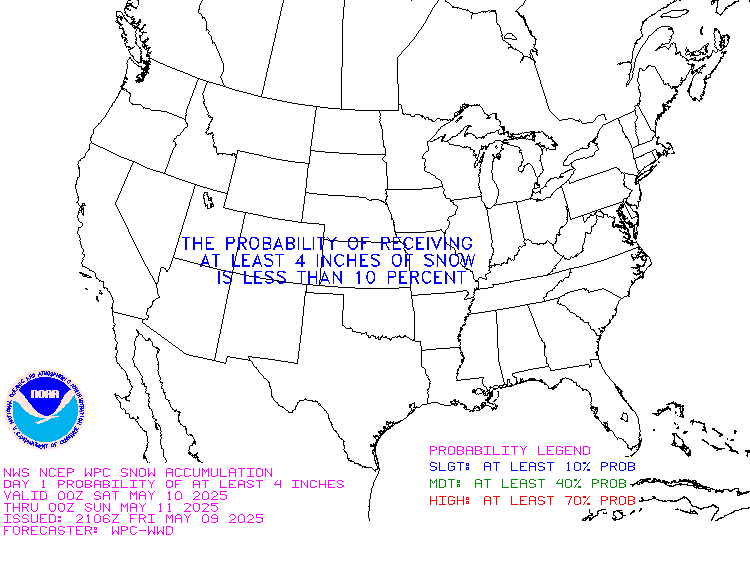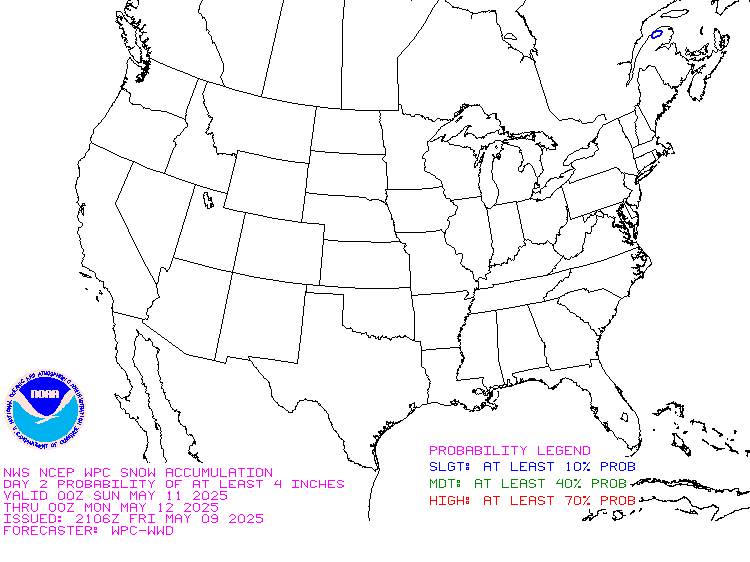It is difficult to find a more comprehensive Weather Outlook anywhere else with the ability to get a local 10-day Forecast also.
This article focuses on what we are paying attention to in the next 48 to 72 hours. The article also includes weather maps for longer-term U.S. outlooks and a six-day World weather outlook which can be very useful for travelers.
First the NWS Short Range Forecast. The afternoon NWS text update can be found here but it is unlikely to have changed very much. The images in this article automatically update.
Short Range Forecast Discussion
NWS Weather Prediction Center College Park MD
Wed Feb 28 2024
Valid 12Z Wed Feb 28 2024 – 12Z Fri Mar 01 2024…Heavy snow over parts of the Cascades, the Northern Intermountain
Region, Northern California, and Sierra Nevada Mountains……Light to moderate snow over the Great Lakes, Central Appalachians, and
Northeast……Temperatures will be 10 to 25 degrees above average over parts of the
Northeast and Mid-Atlantic…A second winter storm will impact the West Coast on Wednesday and
Thursday. The second significant winter storm will primarily affect the
Northwest Wednesday and Thursday before significantly impacting the
Northern and Central California mountains Friday.The storm will create heavy mountain snow that will affect many passes.
Multiple feet of snow are likely (over 80% chance) for higher elevations,
significantly above 5000 feet, including many Cascade and Sierra Nevada
Mountains passes. Extremely heavy snow rates surpassing 3 inches per hour
are possible in these mountain ranges.Furthermore, the storm will produce blizzard conditions in the Sierra
Nevada Mountains. In detail, strong winds will cause significant blowing
and drifting snow, with whiteout conditions, making travel impossible in
the Sierra Nevada Mountains. There is a high chance (over 70%) of
substantial, long-lasting disruptions to daily life in the higher
elevations of the Sierra Nevada Mountains Friday, where blizzard
conditions and over 5 feet of snow are expected.Moreover, in addition to the snow, coastal rain will develop over parts of
the Pacific Northwest Wednesday into Friday. Coastal rain will develop
over parts of Northern California overnight Wednesday, continuing into
Friday. The rain moves into Central California on Thursday, continuing
into Friday, and parts of Southern California by Friday morning.Meanwhile, on Wednesday, a deep low over the Upper Great Lakes will move
northeastward into Eastern Canada by Wednesday evening. The associated
front will move off the East and Gulf Coast by Thursday morning. Ahead of
the front, southerly wind will bring warm temperatures of 10 to 25 degrees
above average over parts of the Northeast and Mid-Atlantic.On Wednesday, the boundary will create showers and thunderstorms from the
Central Gulf Coast to the Northeast. In the wake of the front, moderate to
heavy snow will develop over the Great Lakes into the Northeast, with
light to moderate snow over the Central Appalachians on Wednesday. In
addition, on Thursday, lake-effect snow will develop downwind from the
Great Lakes, ending by Thursday night.Elsewhere, upper-level energy moving into the Southwest and Southern
Rockies will produce scattered showers, thunderstorms, and
higher-elevation snow from Wednesday afternoon into Thursday. Overnight
Thursday, showers and thunderstorms will develop over parts of the
Southern Plains, moving into the Lower Mississippi, Tennessee, and
Southern Ohio Valleys and parts of the Southeast.
To get your local forecast plus active alerts and warnings click HERE and enter your city, state or zip code.
Above is a 72 hour animation of the forecast. Learn about wave patterns HERE.
Then, looking at the world and of course, the U.S. shows here also. Today we are looking at precipitation.
Please click on “Read More” below to access the full report issued today.
| Notices: What would you like to learn about? Please provide that to me via the comment section at the end of the article. |
Now more detail on the 48-Hour Forecast (It is a 48 to 72 Hour Forecast actually)
Daily weather maps. The Day 1 map updates twice a day and the Day 2 and 3 maps update only once a day. These maps update automatically. But if that does not happen, you can get updates by clicking HERE
TODAY (or late in the day the evening/overnight map will appear) (Key to surface fronts shown on maps and you will then also be able to insert a city name or zip code and get a local NWS forecast).
TOMORROW
NEXT DAY
This animation shows how things may play out over the next 60 hours. To update click here.
The NWS Climate Prediction Center’s: Watches, Warnings, and Advisories plus other information can be found HERE. We post at least one of those updates daily, sometimes both. The Highlights are shown in the lede paragraph of this article.
ATMOSPHERIC RIVERS
This tells us what is approaching the West Coast. Click HERE to update If I have not gotten around to doing the update. Here is some useful information about Atmospheric Rivers.
Below is the current five-day cumulative forecast of precipitation (Updates can be found HERE)
Ski SnowReports
New Feature – Ski Reports. It is difficult to find reports that auto-update on-screen (and they are very long) but these links will get you to them – If you have additional suggestions make them in the comments section after every Econcurrents Article and we may add those links. We will try to not have too much overlap as that can add to the confusion.
Snow Forecasts. And remember this shows natural snow. Ski resorts also make their own snow.
Day 1

Day 2

Additional snow information can be found here, here, here, and here. The second link provides animations.
Now we look at Intermediate-Term “Outlook” maps for three time periods. Days 6 – 10, Days 8 – 14, and Weeks 3 and 4. An outlook differs from a forecast based on how NOAA uses these terms in that an “outlook” presents information as deviation from normal and the likelihood of these deviations.
Below are the links to obtain updates and additional information. They are particularly useful if you happen to be reading this article significantly later than when it was published. I always try to provide readers with the source of the information in my articles. These links may also be useful for those viewing this article on a cell phone or other small screen.
| Days 6 – 10 (shown in Row 1) | Days 8 – 14 (Shown in Row 2) | Weeks 3 and 4 (Shown in Row 3 but updates only on Fridays) |
| https://www.cpc.ncep.noaa. gov/products/predictions/610day/ | https://www.cpc.ncep .noaa.gov/products/predictions/814day/ | https://www.cpc.ncep.noaa.gov/products/predictions/WK34/ |
Showing the actual maps. They should now update automatically. The Week 3 – 4 Outlook only updates on Fridays. So below is what I call the Intermediate-term outlook. On Fridays, it extends out 28 Days. That declines day by day so on Thursday it only looks out 22 days until the next day when the Week 3 – 4 Outlook is updated and this extends the outlook by one additional week.
| 6–
10
|
|
|
| 8–
14 |
|
|
| 3–
4 |
|
|
HAZARDS OUTLOOKS
Click here for the latest complete Day 3 -7 Hazards forecast which updates only on weekdays. Once a week probably Monday or Tuesday I will update the images. I provided the link for readers to get daily updates on weekdays. Use your own judgment to decide if you need to update these images. I update almost all the images Friday Night for the weekend edition of this Weather Report. So normally readers do not need to update these images but if the weather is changing quickly you may want to.
Temperature month to date can be found at https://hprcc.unl.edu/products/maps/acis/MonthTDeptUS.png
Precipitation month to date can be found at https://hprcc.unl.edu/products/maps/acis /MonthPNormUS.png
World Forecast [that website is has been intermittent so be patient]
Below are the Day 1 -3 and 4-6 forecasts for temperature and precipitation. Updates and much additional information can be obtained HERE
World Temperature Anomalies
World Accumulated Precipitation
This information is provided by the University of Maine. They draw upon many different sources. There is a lot of information available at the link provided. I have just provided two useful forecasts. There are probably over a hundred different forecasts available from this source.
Worldwide Tropical Forecast (This is a NOAA Product)
This graphic updates on Tuesdays) If it has not been updated, you can get the update by clicking here Readers will only have to do that if they are reading this article much later than the date of it being published.
Information on Tropical Storms can be found HERE. Western Pacific information can be found HERE.
–
| I hope you found this article interesting and useful. |
–

